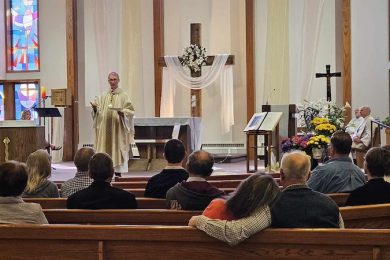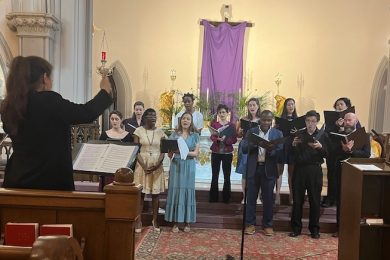Have you ever turned off a TV show, walked out of a movie, not finished a book, abandoned an article in a magazine or newspaper?
Perhaps it made no sense to you, or it was too long with too many plot twists. Maybe it stirred difficult memories or feelings, or simply failed to engage you. Leaving the story early means we do not know what we have missed, often the most important part that would tie the rest together.

In the virtual world of entertainment and relationships, we are accustomed to a measure of control — to click or not to click, that has become the question. All of us have days when we wish we could just change the channel, or pause or rewind and run it again.
Life is not that way. Each chapter, lived in sequence and through to the credits, has value, purpose and lessons to teach.
At the Legislature again
This session of the Minnesota Legislature has recently seen the return of the issue of assisted suicide in “The End-of-Life Option Act of 2017.” Introduced also in 2016, it was withdrawn by its authors. This year’s version has small tweaks but no meaningful differences.
There are many reasons to reject legalizing assisted suicide, each of them grounded in sound social policy and long human experience.
Assisted suicide undermines the value and dignity of life. Its legalization, though claimed to be only for those with terminal illness, also exposes those who live with significant disabilities or those who already lack social support to the slippery slope that moves from a “right to die” for those who wish it to a “duty to die” for those who do not.
It is contrary to the medical profession’s fundamental purpose and integrity. It makes the choice for death a mainstream option that may attract those, including the young, whose depression or despair can be addressed in life-giving ways. It weakens motivation to develop better therapies and end-of-life care. It may trade lives for dollars, as hastening death is inevitably cheaper than extending care for a longer period.
But such principled arguments often fail to persuade those who favor assisted suicide. Some focus on the admirable concern to alleviate suffering, even to the point of ending life to achieve it. Others believe that individual freedom extends as far as this choice to end one’s life, validated and facilitated by law.
We can agree that suffering calls for compassion and relief. Palliative care exists precisely to attend to the physical, psycho-social and spiritual distress of those who face serious illness, and also seeks to support their caregivers. States that have legalized assisted suicide report that when bodily and emotional pain are addressed — whether the suffering is current or (as is most common) anticipated in the future — requests for assisted suicide are withdrawn.
Each day, families deal with the tragedy of suicide. The fear, loneliness and personal pain borne by some may lead them to find the future unbearable, and they seek an end to their distress. Such existential suffering calls for more care, not less, in gestures of hope and presence.
However, these laws expressly forbid the use of the term suicide. It is “aid in dying,” or “compassionate choice,” or “self-delivery” or an “end-of-life option.” Lawmakers and advocates cannot seem to bring themselves to call what is happening by its own name.
Caring for others
Some chapters of life’s story challenge us to the core. They may make no sense, or drag on, or stir difficult memories and feelings. But they are never unimportant for shaping who we are as individuals and as a society. When we live them through to the credits, they bring out the greatness of the human spirit that is able to cope, persevere and grow stronger.
This above all is when we need one another. Quality of life is not defined in isolation solely by symptoms and pain scales; it is determined in no small measure by the kindness and mercy of those around the person in need. These often emerge at the end of life’s story in ways we never knew before.
In 30 years of ministry, I have been inspired by so many examples of tireless and genuine care for those approaching death. Medical professionals, neighbors, families and even strangers have supported, accompanied, comforted, laughed and cried along with one whose life was impacted, but not defined or devalued, by the prospect of dying. To be present, hold a loved one’s hand and keep vigil with a fading light — these reveal the unfading dignity of human life and demonstrate the mutual gift of true compassion that enriches both those who give and those who receive.
It is true that assisted suicide is in some ways easier, cheaper, quicker and more certain than this accompaniment of the dying. But I deny that it is more humane, daring or worthy of the title “compassion.”
When we put our energy and resources into improving care of the dying and their loved ones, we will create a better future for each of us and all of us, where the full story of each life is cherished regardless of its condition, rather than creating a society where life is regarded as a movie we can walk out of when it no longer engages us.
Those who do not share the Christian’s creedal conviction in “the resurrection of the dead and the life of the world to come” must at least own with us the inevitability of dying.
But while death will visit each of us, it need not be our master. Suffering, fear and dependence on others may threaten what we cherish and hold important in life, but assisted suicide allows death to have the final and strongest word. Why play directly and prematurely into that cold and sterile hand?
Father Tom Knoblach is consultant for health care ethics for the Diocese of St. Cloud. He is also pastor of the parishes of Holy Spirit, St. Anthony and St. John Cantius in St. Cloud.




















